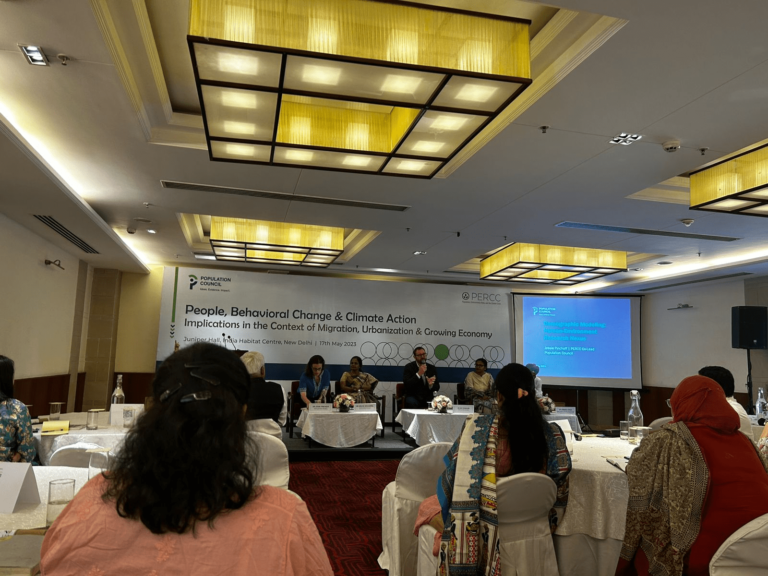
- This event has passed.
People, Behavioral Change, and Climate Action: Implications in the Context of Migration, Urbanization, and Growing Economy
May 17, 2023

On May 17, 2023, the POP Mentors, Drishya Pathak, Komal Mittal, and Remigius Fernandes, had the privilege of attending a remarkable conference on People, Behavioral Change, and Climate Action, organized by the Population Council, India—an esteemed initiative of PERCC, focused on developing critical programmatic solutions through academic consultation. The conference comprised three insightful sessions: the opening session, the technical session, and the panel discussion.
Dr. Thoai Ngo, in his introduction to the Population Council, shed light on the pressing issues surrounding the rising generation. Meanwhile, Dr. Aravinda Mishra emphasized the importance of amplifying voices for climate action. He stressed the need to engage the most crucial stakeholders—society and people—on the stage of inclusivity. Drawing from the IPCC’s 6th Assessment Report, he cautioned about the likelihood of overshooting the 1.5-degree target.
“We acknowledge that behavioral change is occurring, but we must question whose behavioral change we are truly addressing.”
The trends in behavioral change are intrinsically intertwined with the lifestyle choices we make, greatly impacting economic growth, particularly among vulnerable groups. These groups need to adopt practices to combat climate change, and this can be achieved through active engagement with institutions. It becomes evident that a systemic transformation is necessary, with technology and people at the center of climate change. Furthermore, it is crucial to involve the migrant community. An interdisciplinary approach, with a strong emphasis on health, is paramount.
Dr. R. R. Rashmi, from TERI, discussed the national, global, and international relevance of behavioral change in recent years. He highlighted the dominant factors contributing to climate change, such as increasing urbanization, globalization, and population growth. He also emphasized that global warming will continue to rise.
Looking towards the future, he outlined a framework of possible actions to facilitate societal growth. Firstly, a policy of climate-resilient development must be adopted, and aspirations for 2050 Net Zero goals, as seen in other countries, should be defined. Secondly, sub-national actions should be implemented, focusing on specific frameworks for climate actions. Thirdly, resources play a vital role, with 80% of mobilization coming from domestic financial systems. Finding ways to encourage the commercial banking system to prioritize smaller areas and communities is essential. Lastly, incentivization at the national, state, and corporate levels is crucial for resource allocation.
Dr. Urvashi presented insights on individual actions and transformative action at a personal level through the lens of “mission life.” Climate change evokes fear in the common person, and tangible differences must be made to ensure that individuals feel a personal stake in addressing climate change. The application of gamification, such as “Meri Life,” can serve as a catalyst for growth, mobilizing stakeholders and creating an enabling environment that empowers people to take action.
Finally, Dr. Venugopal delved into the drivers of climate change, highlighting the parallel relationship between human behavior and its impact on the climate. He stressed the need for introspection and a profound shift in our approach to influencing our immediate circles.
Overall, the conference was an enlightening experience, providing a platform for thought-provoking discussions and insights. The POP Mentors left the conference inspired and armed with a deeper understanding of the crucial role behavioral change plays in combating climate change and creating a sustainable future.





